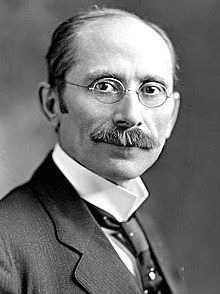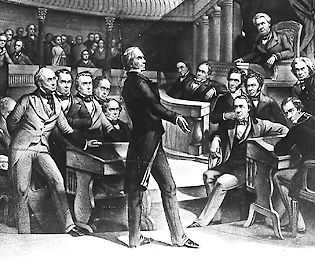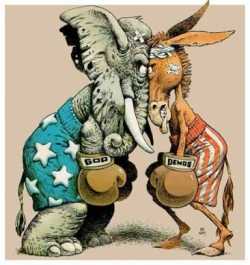Related Topics
Improving Our Political System
Republics and their Flaws
Revisionist Themes
In taking a comprehensive view of a city, an author sometimes makes observations which differ from the common view. Usually with special pride, sometimes a little sullen.
Government Organization
Government Organization
Shaping the Constitution in Philadelphia
After Independence, the weakness of the Federal government dismayed a band of ardent patriots, so under Washington's leadership a stronger Constitution was written. Almost immediately, comrades discovered they had wanted the same thing for different reasons, so during the formative period they struggled to reshape future directions . Moving the Capitol from Philadelphia to the Potomac proved curiously central to all this.
George Washington in Philadelphia
Philadelphia remains slightly miffed that Washington was so enthusiastic about moving the nation's capital next to his home on the Potomac. The fact remains that the era of Washington's eminence was Philadelphia's era; for thirty years Washington and Philadelphia dominated affairs.
Personal Passions
My own personal short list; eight decades in retrospect.
..Constitution and Court
Forget all those lawyer jokes you hear. The American legal profession can rightly be proud of the Federal Court System, an achievement of the whole profession. America may be legalistic and overlawyered, but that reflects the rule of law dominated by lawyers. Curiously, the leader of this creation, John Marshall, was not so much a legal theoretician as a relentless Federalist lawyer, determined to reshape the legal profession to be worthy of power.
Addressing the Flaws of Republics
EVERYONE might profit from reading Plato on the subject of republics, not to mention reading James Madison. Both The Republic and The Federalist were conjuring republics they proposed, not ones they had experienced. After Madison did get the hands-on experience he had such radical changes of opinion his friend George Washington essentially never spoke to him again. Not only in republics, of course, does reality prove different from founding theory. It might seem more measured to say of republics that two centuries of their reality proves to be such an extension of theory, it effectively departs from it. In essence, the Republican idea is to limit the voters to one periodic review of their representative's term of office overall, not in ongoing picky detail which would hamper him. This definition contrasts republics with democracies and implies the reason to favor republics. The elected representative is given full power to act during his term in office, but must eventually face the voters for accounting at the fixed time for re-election. Plato and Madison were right about extending latitude to one's chosen representative, but they failed to predict how effectively that latitude might be stolen by the legislative body itself and controlled by rules and leadership which skirt ratification by the general public outside their chamber, in any district. The Romans, of course, did know what they were talking about, but history has tended to ascribe Roman difficulties -- assassinations, for example -- to flaws in Roman character rather than in the construction of the Roman Republic. After describing some problems history has revealed about our own system, this essay is written to propose a solution. A second essay follows, to defend that solution.

|
| Joseph L Bristow |
The differences between House and Senate in the original U.S. Constitution were three, but since the Seventeenth Amendment in 1913, there are now only two. Originally, Senators were selected by the states they came from, mostly by the legislatures. A century of experience demonstrated the result was cronyism, members of the legislature using senatorial appointments as bargaining chips and for the most part limiting the choice to one of their own members. The provision probably did attract a higher grade of legislator overall, encouraging those primarily ambitious to be U.S. senators to have a try-out in the minor leagues first. It did give the State government serious power to punish a U.S. senator who failed to please the home state. And this selection process made it simpler and cheaper to run for the job as U.S. senator. This feature encouraged candidates with competing for career choices, otherwise discouraged by the expense and unpleasantness of candidacy, to step forward. But by 1913 all this was seen as a way for cronyism to dominate the process, swapping appointments for favors, or even more tangible bribes. From the distance of another century, it can be seen that the steadily declining power of state legislatures was matched by a declining quality of their elected membership, leading to a rising level of sordidness in their foibles. Hapless amateurs were largely supplanted by career politicians. After the Civil War "states rights" stirred up memories of secession and led to a deliberate weakening of the states' role. Whatever the reasoning, the mentality of Progressivism was sweeping the country in 1913, and popular election of senators was deemed a Good Thing, swept into general satisfaction. Doubt about whether it all made as much difference as claimed lies in the reality that from 1913 to 2010, one quarter (182) of all Senators have first arrived in the Senate through appointment by a Governor to fill an unexpired vacancy. Many of these vacancies have of course been contrived for the purpose.
The relative power of a senator and a representative lies in the size of the population who vote for them, and the frequency with which they must endure that unpleasantness. Members of the House are elected for two years and members of the Senate are elected for six; the voting constituency of 100 Senators is generally much larger than that of 532 Representatives, so because the population grows faster than the number of states, the representation discrepancy also grows. The frequency of running for reelection seems to be so irksome that whenever a Senate seat falls vacant, some sitting Congressman from that state is almost certain to try to switch. Of course, it is true that with only a quarter as many senators as congressmen, the power of each vote is weightier. To the extent that committee memberships represent special insider power, a senator does belong to more committees but is more severely stretched to attend them all. Each senator's vote does have a greater scarcity value, but a Representative who tends to business is more likely to know what he is talking about, hence better able to be influential in the committees where most matters are really decided. The limits of merit promotion in both houses of Congress lie in the differing power of various committees, while the favor of appointment remains within the iron control of caucus leadership. In public, senators seem generally more polished and experienced in public persuasion. The persuasion that counts, however, is of gaining the respect of colleagues in your own legislative body, always restrained by the power of leadership to coerce conformity. Public persuasiveness, by contrast, is often little more than glibness, reflecting greater experience with dodging an issue to conceal a lack of depth in it. Almost all senators aspire to the presidency, although few achieve it. No Congressman has been elected President since Warren Harding; indeed, few Congressmen even dare to seek the nomination. The appointment of Gerald Ford was a special situation. However, it is worth pondering that during the early days of the republic, the House of Representatives was considered much more prestigious than the Senate, and that curiosity continues to raise an important question just why it is now reversed.

|
| George Washington |
The differences in prestige between the House and the Senate cannot be ascribed to the comparatively minor differences in their Constitutional definition, the size of their district and the frequency of election. Otherwise, we could immediately improve the quality of congressmen by reducing the limit of their number and frequency of re-election, which scarcely anyone has proposed. The more likely source of the problem can be found in the differing rules of procedure which each body has adopted; and reaffirms at the opening of each term. Various strategies of committee assignment and seniority have adapted to the reality that newly elected politicians rarely have any skills other than the ability to get elected. But almost everyone can learn, given enough time being exposed to a topic. A seniority system can occasionally lead to someone who is hopeless, gradually floating into a position where he can do great harm. Provision must be made for graceful exceptions to the seniority rule, usually by excluding a member from important committees until he has demonstrated some competence, less often by later dropping someone who has age- or alcohol-diminished faculties. Underlying this approach is a contempt bred of experience for the wisdom of the voters, back there in the district, whereas the leaders of the fraternity can protect the nation by judiciously devised rules. Sometimes it is, unfortunately, necessary to be a little hard boiled.
So far so good. When Jefferson and Martin Van Buren invented political parties, the bodies of Congress responded by inventing caucuses. George Washington was not a learned man, but he knew he hated this system. James Madison probably feared political parties more than he hated them, so he incurred Washington's permanent displeasure by getting good at manipulating what he saw as the winning strategy. Van Buren's fate was more ironic; after inventing many of the unpleasant little strategies of modern politics, he was defeated by William Henry Harrison in the "log cabin" election of 1840. Harrison hadn't been born in a log cabin at all, he was born in a Virginia mansion, hee, hee, hee. George Washington wouldn't have chuckled at that one, he would have been livid.

|
| Henry Clay |
Party caucuses have only one central feature, which is vote-swapping. Many of the strategies of this unattractive behavior were outlined in elegant detail by Pliny the Younger, in the Roman Senate, and James Madison the student of government had sought to avoid them. When he decided it was hopeless, he joined them and got good at it. In retrospect, the premier example of vote-swapping was the trade which Madison and Hamilton made, placing the nation's capital in Virginia/Maryland instead of Philadelphia, in return for federally redeeming the Revolutionary debts for all 13 states, when Virginians had already paid theirs off. Philadelphia had essentially nothing to say about it. Pliny had cautioned and subsequent practitioners have followed the advice to cover your tracks by swapping votes for an issue seemingly unrelated to the one in dispute. That's about all there is to vote-swapping, find out what the guy wants badly enough, and trade him something for it. It follows that it's wise to give off the appearance that you don't want much of anything. A corollary is that political caucuses try to conduct even innocent or public-spirited discussions in secret, making public only what is expedient to be made public. And a further corollary: some members of a caucus are from totally "safe" districts. Occasionally their votes can safely be traded for something the opposing party wants but the caucus feels necessary to claim to oppose. When a caucus wants something badly enough to trade it for something else but is three or four votes short, the opposing caucus may trade the four votes from safe districts while violently denouncing the dirty turncoats. All this is known as party loyalty. When things are particularly tough, party loyalty can be enforced by finding out what you want badly and taking it away from you. When these whips are applied to you, a grievance develops. Fine, what do you want to trade in return for vengeance? Many of these refinements seem to come, not from Rome, but from Sicily.
As was stated at the beginning, the purpose of this essay is not to rail at Congressional corruption, but to counteract it to some degree. Since the worst features of this system require secrecy and public duplicity to be effective, the best remedy is sunshine. Not about what Roosevelt did in his third term, but about what your local congressman might do next week, and his fear you will find out. His fear that a blogger will tip off the local newspaper or radio station, encouraging someone else with the ambition to file for election against you. And his fear that when he asks someone for a campaign contribution, that person will bring up the topic in question. His fear that the local political boss will decide he can't win.

|
| Boxing Politicians |
This was more or less the system which the founding fathers, James Madison chief among them, envisioned for this shining city on a hill. And which two centuries of rather clever schemers have gradually eroded. The highly desirable feature of a republic is that the elected person is free to represent his own interpretation of what is best for his district or, failing that, what is best for the nation. The elected representative is encouraged to risk defeat in the next election, if in his judgment what is good for the district is bad for the nation. But he is not a suicide bomber if his vote will make little difference in the outcome he can be forgiven for taking cover. One would wish that fewer of them would speak one way and vote in the opposite direction, but that can be forgiven if someone back home in the district is keeping score and letting others know of it. The fundamental principle of a republic as distinguished from a pure democracy is that a representative, while free to act during his term in office, remains obliged to face the voters at the appointed time. Our system has come to exaggerate the actual extent of freedom to use judgment because the freedom has been stolen by party leaders through the application of schemes too devious to detail. But freedom is fundamentally a good thing. What has come to be so lacking is the idea of facing an informed electorate in making a choice between you and an informed opponent. The public, it must be feared, doesn't know beans.
And so the proposal for fixing this mess is difficult, but it can be stated simply. The recent economic boom created nearly a thousand billionaires; maybe four hundred would be a number that would escape challenge. If only fifty of them would endow think tanks in all fifty state capitals, and the fifty-first would endow an organization dedicated to making their research available to the public, then perhaps another fifty would be prompted to create a second think tank in each state capital on the opposite political side. Two polarized think tanks in each state capital, just imagine it. As things now stand, it would be a sufficient first step if that happened in only one state, and the rest of the country could watch what happens.
Originally published: Wednesday, July 28, 2010; most-recently modified: Sunday, July 21, 2019